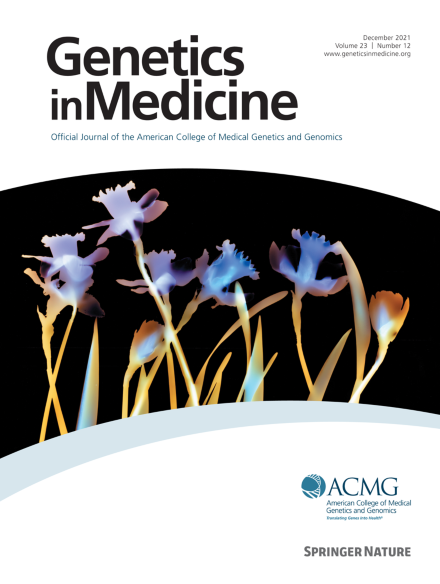Estimation of carrier frequencies of autosomal and X-linked recessive genetic conditions based on gnomAD v4.0 data in different ancestries
IF 6.6
1区 医学
Q1 GENETICS & HEREDITY
引用次数: 0
Abstract
Purpose
Monogenic rare diseases contribute significantly to infant deaths and pediatric hospitalizations and cause burden to the patients and their families. The American College of Medical Genetics and Genomics recommended in 2021 that carrier screening of autosomal recessive and X-linked conditions with a carrier frequency of ≥1/200 and a severe or moderate phenotype should be offered when planning or during pregnancy. In November 2023 gnomAD v4.0 was released. It contains in total 807,162 individuals, being nearly 5× larger than previous versions, which have been used to estimate gene carrier frequencies (GCF).
Methods
We utilized gnomAD v4.0 (GRCh38) to calculate the GCFs for available genetic ancestry groups for variants having pathogenic or likely pathogenic classification (>80% of submissions) in ClinVar. We calculated GCF separately for exomes and genomes, combined data, and at-risk couple frequencies (ACF) per genetic ancestry group.
Results
In total, 324 genes had a GCF ≥1/200 in at least 1 ancestry subgroup. The number of genes with GCF ≥1/200 varied greatly between subgroups. ACFs were more similar, Ashkenazi Jewish having the highest ACF of 6.11%.
Conclusion
Improved understanding of carrier risks and updated carrier screening content would allow patients to make more informed reproductive decisions.
基于 gnomAD v4.0 数据估算不同血统的常染色体和 X 连锁隐性遗传病的携带者频率。
目的:单基因罕见病是造成婴儿死亡和儿科住院的重要原因,并给患者及其家庭带来负担。美国医学遗传学和基因组学学院于 2021 年建议,在计划怀孕或怀孕期间,应对携带者频率≥ 1/200 且表型为重度或中度的常染色体隐性遗传病和 X 连锁遗传病进行携带者筛查。2023 年 11 月,gnomAD v4.0 版本发布。它总共包含 807 162 个个体,比以前的版本大近 5 倍,已被用于估算基因携带者频率(GCF):我们利用 gnomAD v4.0 (GRCh38)计算了 ClinVar 中具有致病性或可能致病性分类(>80% 的提交)的变异的可用遗传祖先群体的 GCF。我们分别计算了外显子组和基因组的 GCF 以及合并数据,并计算了每个基因祖先组的高危夫妇频率(ACF) 结果:在至少一个基因祖先亚组中,共有 324 个基因的 GCF ≥ 1/200。不同亚群中 GCF ≥ 1/200 的基因数量差异很大。ACF较为相似,阿什肯纳兹犹太人的ACF最高,为6.11%:结论:提高对携带者风险的认识和更新携带者筛查内容可使患者做出更明智的生育决定。
本文章由计算机程序翻译,如有差异,请以英文原文为准。
求助全文
约1分钟内获得全文
求助全文
来源期刊

Genetics in Medicine
医学-遗传学
CiteScore
15.20
自引率
6.80%
发文量
857
审稿时长
1.3 weeks
期刊介绍:
Genetics in Medicine (GIM) is the official journal of the American College of Medical Genetics and Genomics. The journal''s mission is to enhance the knowledge, understanding, and practice of medical genetics and genomics through publications in clinical and laboratory genetics and genomics, including ethical, legal, and social issues as well as public health.
GIM encourages research that combats racism, includes diverse populations and is written by authors from diverse and underrepresented backgrounds.
 求助内容:
求助内容: 应助结果提醒方式:
应助结果提醒方式:


